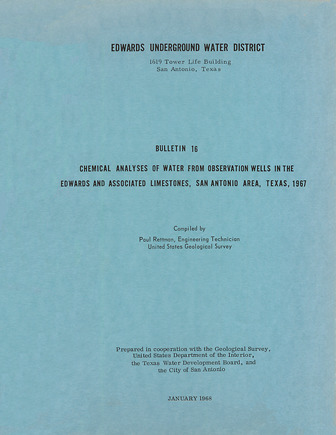Chemical Analyses of Water from Observation Wells in the Edwards and Associated Limestones, San Antonio Area, Texas, 1967

| Author | Rettman P (US Geological Survey) |
| Year | 1968 |
| Description | Chemical analyses of water from 37 wells to define the boundary of the freshwater-saline water interface in the Edwards Aquifer Balcones Fault Zone San Antonio segment in 1967. Note: This report is included for its historical value; results may have been superseded by more recent studies. |
| Report Number | Bulletin 16 |
| Publisher | Edwards Underground Water District |
| Location | Freshwater/Saline Interface, Edwards Aquifer Balcones Fault Zone San Antonio Segment |
| Cover | View Download |
| File | View Download |
| Summary |
|
Note: This report is included for its historical value; results may have been superseded by more recent studies. A program to resample observation wells tapping a zone of transition between water of good quality and saline water in the Edwards and associated limestones was begun in 1959. The chemical analyses of the resampling program are being used to detect possible encroachment of saline water into the fresh-water areas as the head in the aquifer changes. Those analyses compiled through 1966 were published by the Edwards Underground Water District (See references, page 3), and this report presents the chemical analyses compiled during 1967. This program is part of a more extensive hydrologic investigation carried on by the U. S. Geological Survey in cooperation with the Edwards Underground Water District, the Texas Water Development Board, and the city of San Antonio. Samples are collected for chemical analyses from 37 wells, most of which are sampled twice a year, but some are sampled only once a year because of their limited use. The number of wells was reduced in 1966 from 72 to 37, but the original 72 will be sampled again when water levels drop to those levels near and below the recorded lows. The well numbers in this report conform to the statewide system used by the Texas Water Development Board (Alexander and others, 1964). The numbers formerly used are listed in parenthesis with each well. The water samples are analyzed in the laboratory of the U.S. Geological Survey in Austin, Texas, for specific conductance, pH, chloride, sulfate, bicarbonate, and hardness. A more complete analysis has been made for one sample from each well, and these analyses are on file in the offices of the Geological Survey in Austin and San Antonio. Locations of wells and other data pertaining to the resampling program may be found in the references. |
Search for Documents
Advance Search
Explore EAA's Scientific Reports
- All Reports
- Modeling
- Hydrology and Hydrogeology
- History
- Groundwater Recharge, Recharge Zone
- Groundwater Movement
- Geomorphology and Caves
- Weather Modification
- Geology
- Water Use and Conservation
- Geochemistry
- Water Resources Planning and Management
- Floods and Drought
- Water Quality
- Climatology
- Surface Water / Groundwater Relationship
- Biology
- Springs, Groundwater Discharge
- Archaeology
- RZ Protection
- Aquifer Levels
- Remote Sensing
- Precipitation
- Overview Studies
